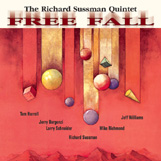






|
 |
Richard Sussman Quintet - Free Fall
DTRCD - 181
Tom Harrell - Trumpet & Flugelhorn, Jerry Bergonzi - Tenor Sax, Larry Schneider - Tenor Sax, Flute & Alto Flute, Richard Sussman - Piano, Mike Richmond - Acoustic Bass, Jeff Williams - Drums
1. Lady of the Lake 8:09
2. Free Fall 6:53
3. The River 8:15
4. Street Fair 5:18
5. Dance of the Spheriods
6. Colors 6:25
7. Tiahuanaco 6:03
|
In a way, the title Free Fall is a bit misleading for this first album, since repeated listenings make clear that Richard Sussman has already arrived. As a pianist, his sure (if nonetheless mortal) technique is put into the service of a flair for well-wrought melody and firmly structured solos: moreover, all the tunes are his, and as a composer he has already stamped them with his interest in dark, deep, and even mysterious themes. As a band leader, he has assembled here a quintet that could take its place on any stage in the land. If you had to pin a label on the music, I suppose youíd reach for ďmainstreamĒ; I offer it mainly to emphasize that his is neither fusion, free, nor passe, but rather a contemporary acoustic band playing in a time-honored jazz format.
Sussmanís influences are still strong enough to be immediately identified, as on the gorgeous Lady Of The Lake (named for the shrouded character of Arthurian legend). Its drifty, romantic melody is redolent of Keith Jarrett, but Sussman wears the aroma well and makes it nearly his own: his short, well-built solo is a model of conception, using thematic mutations to tie together the flightier runs before the unheralded Schneiderís moving, throaty tenor break. Sussman, it turns out, is also a thoughtful arranger, choosing only the most appropriate soloist for each of the tracks and avoiding a jam session sloppiness.
The title tune sports Harrell, the thinking manís Freddie Hubbard, burning through a brief duet with drummer Williams and opening into a tune that Wayne Shorter might have written for the Miles Davis band in 1966. Sussman seems to slow the tempo in his own solo, which starts unaccompanied: moments later Williams reinserts the beat so smoothly that one senses it was never really gone. As usual, Williams is uniformly excellent, a maelstrom with taste: he and Richmond, who doesnít so much play his solos as let them play him, form an impeccable rhythm team with chemistry to spare.
Sussmanís flirtation with other compositional voices is clarified on Street Fair, lightly scored for flute and trumpet, a rousing, festive Latin-styled tune of the sort Chick Corea popularized early this decade. That is, itís rousing and festive within Sussmanís own compositional guidelines of complexity, mild modality, and a latent mystique. The influences are clear, but just as clearly filtered through Sussmanís own considerable talent.
Other highlights: the gently motivic, richly colored piano solo on Colors: Schneiderís spirited tenor work throughout: the guest shots by Bergonzi, a fast, tough, raucous player and a contrastingly oblique melodist: Harrellís continuing grace under fire. These, and Sussmanís smoothly muscled playing and straightforward thinking, make Free Fall a paradoxically weighty flier. There isnít profundity on every track, but thereís nothing less than solid, barely repressed music, and even some close brushes with inspiration. For a first LP, that ainít bad Ďtall.
Neal Tesser - Down Beat Magazine **** (4 Star) Review.
|